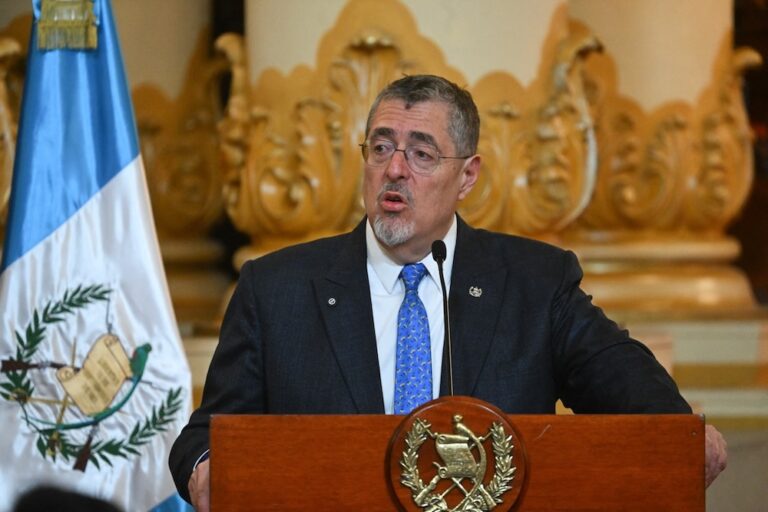(IAPA/IFEX) – The following is a 6 September 2001 IAPA press release: IAPA hails Guatemala government move to end TV monopoly GUATEMALA CITY (September 6, 2001) – Today, the Inter American Press Association (IAPA) welcomed a pledge by Guatemalan President Alfonso Portillo to grant two new television broadcasting licenses to end a TV monopoly in […]
(IAPA/IFEX) – The following is a 6 September 2001 IAPA press release:
IAPA hails Guatemala government move to end TV monopoly
GUATEMALA CITY (September 6, 2001) – Today, the Inter American Press Association (IAPA) welcomed a pledge by Guatemalan President Alfonso Portillo to grant two new television broadcasting licenses to end a TV monopoly in this Central American country, which the Association saw as a curtailment of press freedom.
An IAPA delegation, headed by the chairman of the organization’s Committee on Freedom of the Press and Information, Rafael Molina, told Portillo of its concern at the fact that all four of Guatemala’s television channels are operated by just one person and that he uses them to attack the independent print media, as indicated in recent reports on the state of press freedom compiled by the IAPA.
Portillo acknowledged that Mexican-born businessman Angel González had a television monopoly and he promised to put two operating licenses, for VHF TV channels 5 and 9, out to a competitive bid. The IAPA’s Molina, editor of the Santo Domingo, Dominican Republic, magazine Ahora, said the Association would now be watching closely to ensure that the pledge was carried out and the bidding process is transparent.
Meanwhile, another member of the delegation, former IAPA President Andrés García Lavín, of the Mexican newspaper Novedades de Yucatán, said he would raise the matter at the meeting of the World Press Freedom Committee in Paris, France, on September 20, so that other international organizations would also keep a watch on the process, in order to ensure there would be a better balance in the news available, to the benefit of Guatemalans and their democratic society.
Portillo pledged to respect press freedom in his country as he signed the IAPA-sponsored Declaration of Chapultepec, which sets out principles for free speech and a free press. But he was warned that Guatemalan legislation does not comply with six of the Declaration’s 10 principles.
The IAPA delegation was also in Guatemala to hold a public forum on legislation and press freedom. The organisation warned that there were in fact serious restrictions on the practice of journalism and people’s right to be informed. Among the restrictions discussed were the lack of any law guaranteeing Guatemalans free access to official sources of information and the existence of a number of legal dispositions providing for censorship of news content.
The delegation’s busy schedule also included visits to the Guatemalan Supreme Court and meetings with members of the National Congress, Guatemala City government officials and leaders of various civic and news organizations. Delegation members also visited the newsrooms of the local newspapers Prensa Libre, La Hora, Siglo XXI, El Periodico and Nuestro Diario to chat with journalists about their work.
Another objective of the IAPA mission was to take part in activities paying homage to the memory of local journalist Irma Flaquer, who was kidnapped in 1980 and is presumed to have been killed. Her case has been under investigation by the IAPA since 1995 as part of its Unpunished Crimes
Against Journalists project.
The naming of a city street in her honor, the presentation of a commemorative plaque to be placed on the monument to freedom of expression and a memorial service at the metropolitan cathedral are among the 12 points of an “amicable agreement” reached between the Guatemalan government, the IAPA and the Inter-American Commission on Human Rights. The agreement also includes a pledge that the Guatemalan Attorney General’s Office will work to bring the guilty to justice and that the victim’s family will receive reparations.
At a meeting with justices of the Guatemalan Supreme Court, Chief Justice Leonel Maul Figueroa promised that the judiciary will act to have the Flaquer case re-opened, along with those of other journalists murdered in Guatemala.
Molina, on behalf of the IAPA, thanked President Portillo for ensuring that his government complies with the terms of the agreement. The members of the Impetus Committee of the hemispheric free-press organization also met with government representatives to work out a timetable for the various acts of homage to Irma Flaquer to be carried out.
In addition to Molina and García Lavín, the IAPA delegation was made up of former President James McClatchy, McClatchy Newspapers, Sacramento, California; 2nd Vice President Andrés García Gamboa, Novedades de Quintana Roo, Cancún, Mexico; the regional vice president for Guatemala of the Committee on Freedom of the Press and Information, Gonzalo Marroquín, Prensa
Libre, Guatemala City; Press Freedom Coordinator Ricardo Trotti and Chapultepec Project Lawyer Jairo Lanao.


